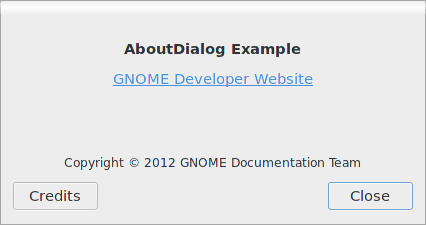
An AboutDialog example using Gtk.ApplicationWindow and Menu
You need to be running Gtk3.4 or later for this to work
1 2 3 4 5 6 7 8 9 10 11 12 13 14 15 16 17 18 19 20 21 22 23 24 25 26 27 28 29 30 31 32 33 34 35 36 37 38 39 40 41 42 43 44 45 46 47 48 49 50 51 52 53 54 55 56 57 58 59 60 61 62 63 64 65 66 67 68 69 70 71 72 73 74 75 76 77 78 79 80 81 82 83 84 85 86 87 88 89 90 91 92 93 94 95 96 97 98 99 100 101 102 103 104 105 106 107 108 109 110 111 112 113 114 115 116 117 118 119 120 121 122 123 124 125 126 127 128 129 130 131 132 133 134 135 136 137 138 139 140 141 142 143 144 145 146 147 148 149 150 151 152
#include <gtk/gtk.h>
/* Callback function in which reacts to the "response" signal from the user in
* the message dialog window.
* This function is used to destroy the dialog window.
*/
static void
on_close (GtkDialog *dialog,
gint response_id,
gpointer user_data)
{
/* This will cause the dialog to be destroyed */
gtk_widget_destroy (GTK_WIDGET (dialog));
}
/* Callback function for the response signal "activate" related to the SimpleAction
* "about_action".
* This function is used to cause the about dialog window to popup.
*/
static void
about_cb (GSimpleAction *simple,
GVariant *parameter,
gpointer user_data)
{
GtkWidget *about_dialog;
about_dialog = gtk_about_dialog_new ();
/* Lists of authors/ documenters to be used later, they must be initialized
* in a null terminated array of strings.
*/
const gchar *authors[] = {"GNOME Documentation Team", NULL};
const gchar *documenters[] = {"GNOME Documentation Team", NULL};
/* We fill in the information for the about dialog */
gtk_about_dialog_set_program_name (GTK_ABOUT_DIALOG (about_dialog), "AboutDialog Example");
gtk_about_dialog_set_copyright (GTK_ABOUT_DIALOG (about_dialog), "Copyright \xc2\xa9 2012 GNOME Documentation Team");
gtk_about_dialog_set_authors (GTK_ABOUT_DIALOG (about_dialog), authors);
gtk_about_dialog_set_documenters (GTK_ABOUT_DIALOG (about_dialog), documenters);
gtk_about_dialog_set_website_label (GTK_ABOUT_DIALOG (about_dialog), "GNOME Developer Website");
gtk_about_dialog_set_website (GTK_ABOUT_DIALOG (about_dialog), "http://developer.gnome.org");
/* We do not wish to show the title, which in this case would be
* "AboutDialog Example". We have to reset the title of the messagedialog
* window after setting the program name.
*/
gtk_window_set_title (GTK_WINDOW (about_dialog), "");
/* To close the aboutdialog when "close" is clicked we connect the response
* signal to on_close
*/
g_signal_connect (GTK_DIALOG (about_dialog), "response",
G_CALLBACK (on_close), NULL);
/* Show the about dialog */
gtk_widget_show (about_dialog);
}
static void
activate (GtkApplication *app,
gpointer user_data)
{
GtkWidget *window;
GSimpleAction *about_action;
/* Create a window with a title and a default size */
window = gtk_application_window_new (app);
gtk_window_set_title (GTK_WINDOW (window), "AboutDialog Example");
gtk_window_set_default_size (GTK_WINDOW (window), 200, 200);
/* Create a new simple action, giving it a NULL parameter type. It will
* always be NULL for actions invoked from a menu. (e.g clicking on an "ok"
* or "cancel" button)
*/
about_action = g_simple_action_new ("about", NULL);
/* Connect the "activate" signal to the appropriate callback function.
* It will indicate that the action was just activated.
*/
g_signal_connect (about_action, "activate", G_CALLBACK (about_cb),
GTK_WINDOW (window));
/* Adds the about_action to the overall action map. An Action map is an
* interface that contains a number of named GAction instances
* (such as about_action)
*/
g_action_map_add_action (G_ACTION_MAP (window), G_ACTION (about_action));
gtk_widget_show_all (window);
}
/* Callback function for the response signal "activate" from the "quit" action
* found in the function directly below.
*/
static void
quit_cb (GSimpleAction *simple,
GVariant *parameter,
gpointer user_data)
{
GApplication *application = user_data;
g_application_quit (application);
}
/* Startup function for the menu we are creating in this sample */
static void
startup (GApplication *app,
gpointer user_data)
{
GMenu *menu;
GSimpleAction *quit_action;
/* Initialize the GMenu, and add a menu item with label "About" and action
* "win.about". Also add another menu item with label "Quit" and action
* "app.quit"
*/
menu = g_menu_new ();
g_menu_append (menu, "About", "win.about");
g_menu_append (menu, "Quit", "app.quit");
/* Create a new simple action for the application. (In this case it is the
* "quit" action.
*/
quit_action = g_simple_action_new ("quit", NULL);
/* Ensure that the menu we have just created is set for the overall application */
gtk_application_set_app_menu (GTK_APPLICATION (app), G_MENU_MODEL (menu));
g_signal_connect (quit_action,
"activate",
G_CALLBACK (quit_cb),
app);
g_action_map_add_action (G_ACTION_MAP (app), G_ACTION (quit_action));
}
/* Startup function for the application */
int
main (int argc, char **argv)
{
GtkApplication *app;
int status;
app = gtk_application_new ("org.gtk.example", G_APPLICATION_FLAGS_NONE);
g_signal_connect (app, "activate", G_CALLBACK (activate), NULL);
g_signal_connect (app, "startup", G_CALLBACK (startup), NULL);
status = g_application_run (G_APPLICATION (app), argc, argv);
g_object_unref (app);
return status;
}
In this sample we used the following:
Got a comment? Spotted an error? Found the instructions unclear? Send feedback about this page.